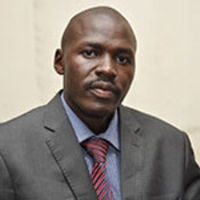
Derrick Van Houten, former Group Chief Executive Officer of Kuku Foods East Africa. PHOTO | SALATON NJAU | NMG
In 1993, Derrick Van Houten decided to push his life to the next level after losing his job.
He was working for Barclays Industrial Bank in South Africa where, as a financial consultant, he was earning as little as $60 a month. The bank decided to close shop in South Africa due to apartheid.
He decided to move to Botswana to try his hand in business. The move was motivated not just by the fact that he had lost his job, but also because he had had enough of working for people who he described as “let-downs.”
He teamed up with a friend and opened up a pizza and pasta restaurant.
Derrick says the business was a runaway success, so much so that they opened six stores over four years.
Potential investors soon came calling and when one put what Derrick described as a very lucrative offer, he sold his stake and started scouting for opportunities, though in retrospect he feels the opportunities scouted for him.
In 2008, he left Botswana for Nigeria to fix a family business. He was called in to restructure Mama Cass restaurant that was basically selling local Nigerian dishes.
The owner “was tired” and wanted to retire. She was simply looking for someone to turn the business around so that it can be sold to a potential investor.
Luckily, in less than a year, Derrick had strategically restructured the business which was then sold once it was on a sound footing.
Just before he was due to leave Nigeria in 2010, he got another phone call from United Africa Company (UAC) of Nigeria, a publicly-listed company based in Lagos.
Its areas of operation include manufacturing, services, logistics and warehousing, agriculture and real estate. The company was also in the food business including operations such as UAC Franchising, UAC Restaurants and UAC Dairies.
It also owned a brand called Mr Biggs that had about 170 restaurants that had been operational for over 25 years. The business, however, was losing colossal amount of money.
He says that the four-year contract he signed to turn the business around at UAC proved challenging. He had to make some very difficult decisions.
He closed non-performing outlets, released over 1,000 staff and in four years found a South African investor who bought 50 percent of the business.
Being a man who had made a name in the hospitality sector, immediately he was done fixing UAC’s restaurant business in Nigeria and was just about to pack his bags and go back to South Africa, he got another offer. This time round, Derrick landed a job as the Group chief executive officer at Kuku Foods East Africa Holdings Ltd.
The US-based fast-food chain Kentucky Fried Chicken (KFC) operates locally through franchisee Kuku Foods East Africa. They started operations in Kenya in 2011 and up-scaled operations to 35 outlets, after selling five in Tanzania. The business has branches in Kenya, Uganda and Rwanda.
Some of their branches in Kenya are located in Lavington, Buru Buru, Village Market. They also have outlets in Galleria Mall, Garden City Mall, the Junction Mall and the Hub shopping complex.
He says that to help turn around the business, because the firm was operating independently across Kenya, Uganda and Tanzania, he created a regional management team. He also had to operate at a reduced cost, and ensure the business was well spread in all the countries they were operating in.
However, things got worse in Tanzania and they had to sell the five restaurants.
“The Tanzania market proved challenging and we made a decision to exit all the branches we had. Tanzanians prefer eating their own local food. The market is not as sophisticated as Kenya.”
So how does he feel leaving Kuku Food at a time he has worked so hard to fix it?
Derrick says that he is happy with the decision he took. He has completed the task he was assigned six years ago and is contented with his life.
He believes that the new management team and shareholders will take the business to the next level.
“The book has been written. The Lord’s chapter has been finished and I need to take on a new challenge now. It will no doubt be another big project in Kenya, as this is my home,” he says.
Derrick believes businesses going through a rocky road can be turned around with a solid plan and the ability to execute that plan.
“Businesses mostly go wrong through poor leadership or insufficient funding,” he says, urging entrepreneurs to watch out for such signs as decreasing margins and increasing debt, which means the business is in trouble.
So what is it that makes Derrick Mr Fix it when it comes to businesses going through a rough patch? He says he valued leadership and success from when he was young, adding that he learnt a great deal about leadership from the various sports he participated in.
The South African-born father of two grew up a humble life. His father, a Dutch by descent, could not take him to a private school due to his meagre earnings.
But he somehow managed to secure him a chance at Cambridge High school in East London for his O-level studies.
Derrick also went to Selborne College- a semi-private English medium male-only high school situated in the suburb of Selbourne in East London.
But despite his father working his way out to secure him a chance in a premier school under the hard circumstances, Derrick was not interested in the classroom work.
Sports was his greatest passion. Derrick says that sports inculcates early leadership skills in an individual. To him, sports made him become the kind of leader he is today.





No comments :
Post a Comment